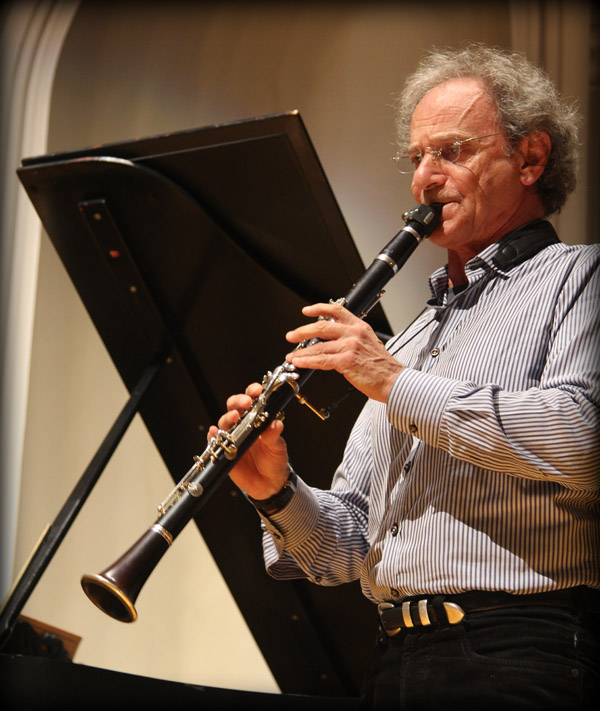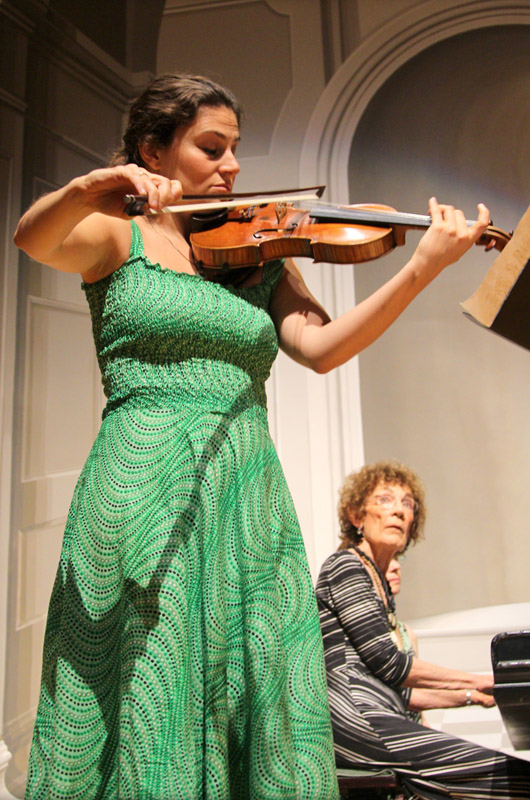Monday night’s final performance of the Martha’s Vineyard Chamber Music Society’s 45th anniversary season was a vivid reminder of the upside to the crowds of July and August. It’s true, so many people are here it can be hard to get into town. But that means enough people are here to build an audience for the world-class chamber music the society brings to the Island each summer.
At the Old Whaling Church — arguably the Vineyard’s finest sonic space — the chamber society on Monday presented an evening of music featuring the unsinkable Delores Stevens, pianist and artistic director of the society, and three talented friends. Clarinetist Franklin Cohen and violinist Diana Cohen are father and daughter. Until this year, since 1976, he’s been principal clarinet of the Cleveland Orchestra; she was recently appointed assistant concertmaster of the Vancouver Symphony. Completing the group was Israeli pianist Roman Rabinovich, winner of the Rubinstein International Piano Master Competition.
“I’m sad and glad tonight,” said Ms. Stevens, welcoming the audience, “because it’s wonderful to see you all, but it is our last concert of the season.”
The program began with a violin-piano duo, one of the great standards of the violin repertoire, Kreisler’s Praeludium and Allegro in the Style of Pugnani. The piece opens in the spirit of an exercise or warm-up routine, the violin spanning large intervals over slow, deliberate chord changes from the piano. Momentum builds gradually until the piece concludes at a breakneck pace. Ms. Cohen handled it all with aplomb, right to the sparkling finish, and the crowd showered her with applause.
Next, Mr. Cohen joined Ms. Stevens on stage for an engaging account of Franz Schubert’s Sonata Arpeggione in A minor, originally scored for a bowed, guitar-like instrument that fell out of use only a few years after Schubert composed the piece in 1824. Since then it’s been transcribed for a wide variety of instruments, from euphonium to double bass, flute and clarinet. The sonata, in three movements, is lyrical, wistful and at points elegiac, with frequent foreground-background shifts between the instruments.
Listening to the sympathetic treatment by Mr. Cohen and Ms. Stevens was a joy. Mr. Cohen’s approach to a melodic line is exquisite, and his ability to make the clarinet sing in just a whisper is extraordinary. To hear him play is to know what mastery of an instrument sounds like.
After an intermission, Ms. Stevens took a seat at the concert Steinway with Mr. Rabinovich for a performance of six short pieces by Gabriel Faure, the Dolly Suite for piano four hands. Composed from 1893-1896, these compositions mark events in the life of the young Helene Bardac, daughter of vocalist Emma Bardac, the composer’s mistress for many years.
Settling in at the piano, Ms. Stevens turned to the audience, exclaimed, “This is fun!” and flashed her best Harpo Marx grin. It was a great moment, a glimpse of the youthful joy in music that has sustained this formidable artist through five decades of dedicated concert performance.
The Dolly Suite is full of enchanting melodies and explorations of the moods the piano can evoke — most memorably when all hands are on deck, filling the hall with an almost orchestral sound. The performers certainly looked like they had fun with the suite, and Ms. Stevens got a hug from her playing partner to go with the applause at the end.
The two Cohens next joined Ms. Stevens on stage for pieces by Robert Schumann and Max Bruch. Diana Cohen this time wielded a viola, whose deeper register was explored to wonderful effect in close-formation work with her father’s efforts on the clarinet. The second movement of the Schumann Marchenerzahlungen was sweetly lyrical and full of space, and the Rumanian melody by Bruch was filled with powerful swells of Germanic emotion.
Finally it was time to bring the season to a close with Igor Stravinsky’s L’Histoire du Soldat, five movements from a piece originally scored for a septet and live performers, telling the story of a soldier who trades his violin to the devil for the promise of unimaginable wealth. If anyone was tiring in the audience after nearly two hours of music on a humid August evening, this was the perfect pick me up — filled with delightful dissonances and so many challenging shifts in meter that Stravinsky’s original version is usually performed with a director.
Monday’s performers directed themselves admirably. Their intensity of attention to each other was exciting to watch, and their account of this witty, ingenious piece of music was confident, playful, highly gestural and entirely bracing. Stravinsky drew on the waltz music of Vienna, on jazz and even ragtime in pulling together this composition, and the trio of Ms. Stevens and the two Cohens got after it, right to the exclamation point of the finish.
The audience was left more than satisfied, with an appreciation for all that the Martha’s Vineyard Chamber Music Society does to enrich the musical life of this community.






Comments
Comment policy »